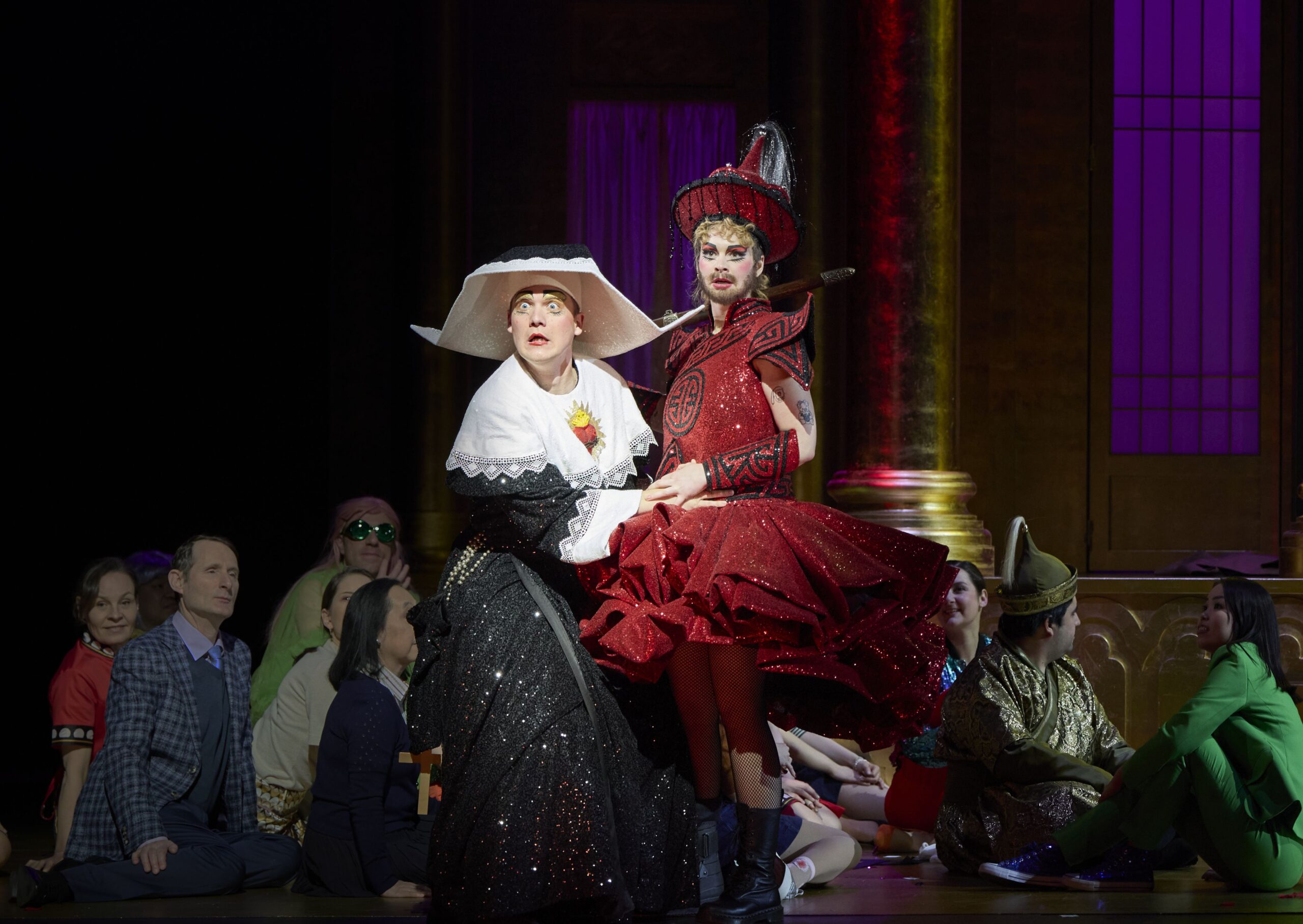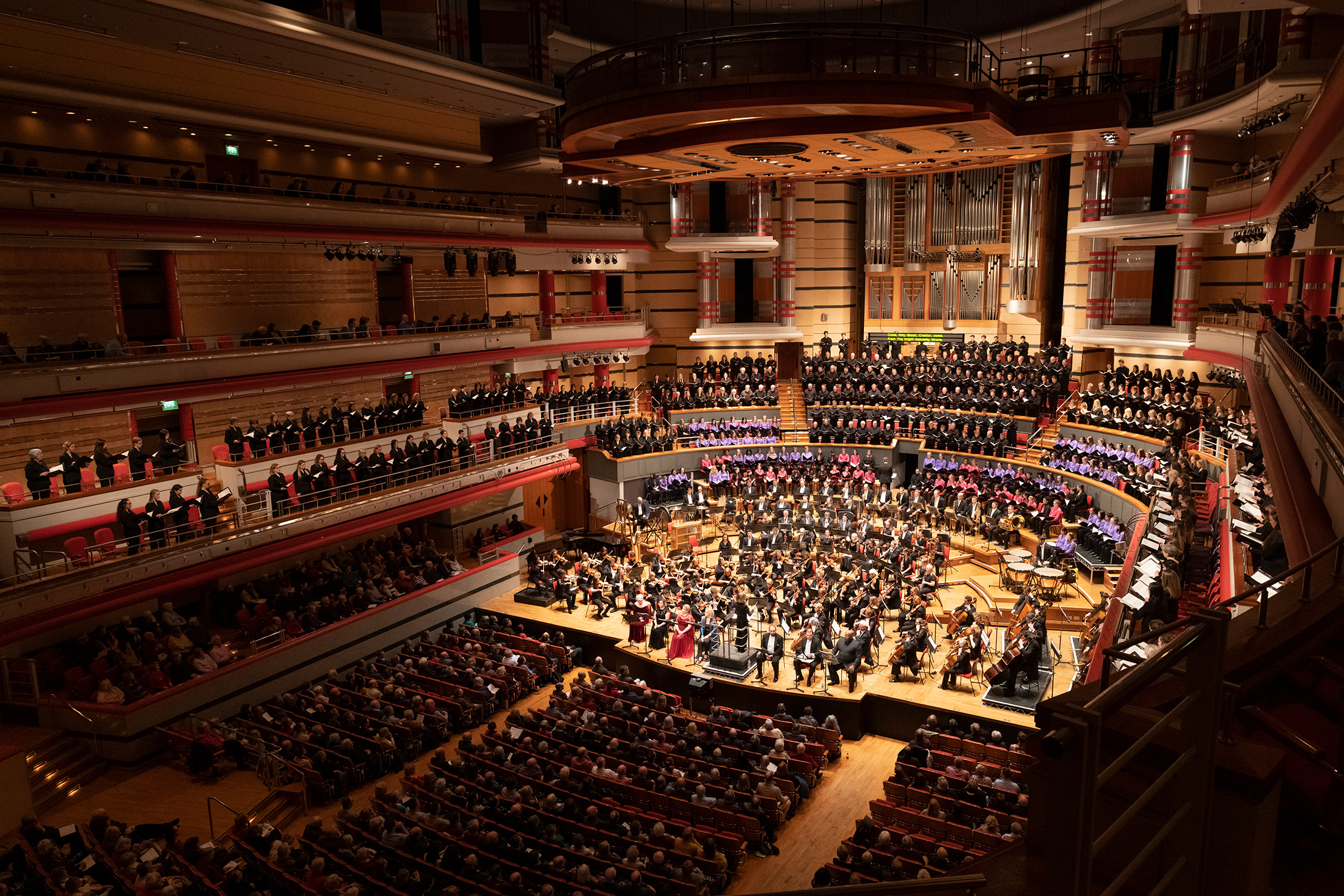A Mongolian Emperor, two eager marketing executives, a misfit heir, a nun, and a bit of horseplay all come together in a jumbled depiction of Salieri’s rarely performed, sometimes crazy opera, ‘Cublai, gran kan de’ Tartari’.
Penned in 1787 to a libretto by Giambattista Casti, Cublai is a comic opera with pertinent themes. Politics and culture collide in the tale of the culture-loving Kublai Khan, ruler of the Tartars, who awaits the arrival of Princess Alzima intended for marriage to his son Lipi.
But, Lipi’s upbringing by Priest Posega has left Khan’s son at best naive – a seemingly problematic part of his succession plan. Memma and Bozzone – two Italian courtiers with considerable influence over strategy – recommend that the Khan’s outdated conventions are modernized, purposefully moving away from centuries-old tradition and towards something a little closer to the rest of Europe.

Princess Alzima is distinctly unimpressed with the person she’s supposed to be marrying (and in love with Khan’s buff nephew Timur). Lipi’s apparent unsuitability is the result of Posega’s questionable guardianship, exposed by Memma and Bozzone, who convince Kublai to banish Lipi to a monastery, agree to Timur and Alzima’s marriage, and appoint Timur as Kublai’s heir. After a bit of resistance, Kublai accepts, securing his kingdom’s future. Crisis averted after an extended exploration of how those in power handle the responsibility they have for their lands and perhaps even for culture.

In a curious turn of events, the premiere of ‘Cublai, gran kan de’ Tartari’ was disrupted by war. Holy Roman Emperor Joseph II called off the work’s inaugural performance following the outbreak of the Austro-Turkish War in 1788. This historical backdrop perhaps inspired the decision to portray Salieri as a character observing and commenting on his own opera throughout the three-hour spectacle, offering the composer a long-awaited premiere denied to him 250 years earlier. His presence on stage made it possible for present-day perspectives to be injected into proceedings, even if the character’s presence on stage sometimes looked like a dementia sufferer wandering aimlessly around a memory garden.

This seemingly drove the storytelling choices, rooting this production in a commercial organization with worldwide aspirations dedicated to the production of Kublai Khan branded chocolates. Memma and Bozzone, an external marketing consultancy, Timur a company exec, and Kublai the present CEO. The idea was interesting, but the execution was (often) lacking visually. Whilst the exaggerated beards and body suits, shimmering glam, and rainbow color schemes were in keeping with the comedic style the opera was rooted in, the unintended consequence felt like more low-budget drag or vaudeville that distracted from the satire it was trying earnestly to be.
With action taking place on the forestage, upstage, and at the back of the stage, sometimes all at the same time, focus was often lost. This challenge was compounded with the need to switch from live action to surtitles to keep across the detail.

By rooting the performance around the outbreak of the Ukraine war, the work’s themes resonated, reflecting the ongoing culture wars and the way in which those in power feel the temptation to exploit them. Ultimately, however, the impact these themes could have had was lessened because of the mismatch in design and direction.
Regardless, a fine cast brought Salieri’s underappreciated writing to life with a range of notable and memorable voices. Giorgio Caoduor combined a reassuringly chocolatey tone with an enthusiastic presence that made the marketing consultant Bozzone far more likeable than many of the marketing creatives his man-bun and pumps persona sought to evoke. Carlo Lepore’s Kublai was more bumbling charismatic than marauding menace, delivering potent insights with powerful intensity.
Alasdair Kent as Timur and Marie Lys as Alzima’s duets were delightful highlights conveying warmth and believability about them that prompted well-deserved enthusiastic applause. Their story – eager corporate boy falls for sassy go-getter with a bit of attitude – was the most engaging of the evening, tender, heartfelt, and, at the point of consummation, as pleasingly urgent as it was borderline coarse. Lauranne Oliva carried off the body suit and fake beard as well as she could, making the would-be heir Lipi seem more boisterous than naive. At times, there was a hint that Lipi rather relished the control he asserted over the comparatively weak fawning Posega.

At the heart of this exhilarating performance was a responsive Les Talens Lyriques under the direction of Christophe Rousset, delivering crisp melodies and tantalizing textures. Special mention to principal clarinet Theo Couillez whose momentary duet with bassoon Carles Valles, and later with oboist Martin Sandler, was pleasingly gritty and raw. The Arnold Schoenberg Choir was strong and powerful throughout.
Rousset’s fascination with Salieri challenges the assumptions Peter Schaffer’s play (and subsequent film) Amadeus established. Once again, his dedication to surfacing the work that might otherwise be overlooked by the mainstream delights those who derive joy in discoveries off-the-beaten track.
A mad evening, but one that stretched and, ultimately rewarded.
📷 Herwig Prammer



